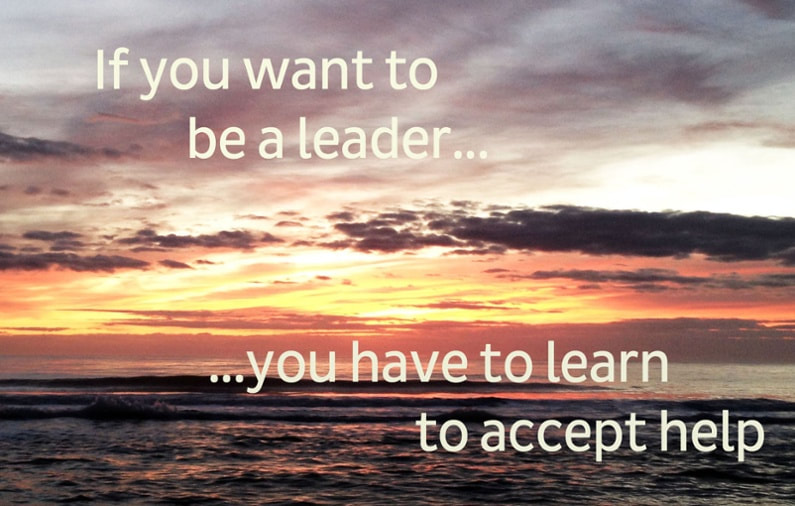“If you want to be a leader, you have to learn to accept help.” Those words hit me square between the eyes. Spoken by a coach soon after I had assumed the biggest leadership role in my career, I wanted to deny the truth of it:
Leadership means asking for – and accepting – help.
This was a serious twist on my way of thinking – I always thought of it as “people doing their jobs.” And the less I had to ask for, the better! The problem was this: The less I asked, the less results we delivered.
Since that hit-me-square-between-the-eyes moment, I’ve started paying attention to how true leaders ask for help.
Sitting in a meeting recently, I heard the new leader of the organization describe what had happened to his predecessor: “The job literally grew right out from under him.” he said. Here’s the interesting part: The person previously in the role (I hesitate to call him a leader) was notorious for refusing help. In fact, when people made offers to take on a variety of tasks, he steadfastly declined, saying he had it handled, all while the ship was slowly sinking. In hindsight, it became clear: he chose to cover up his deficiencies and let the company nearly fail rather than recognize EVERY leader must accept help. Ego strikes again.
What really struck me was the way the new leader was operating. A seasoned executive, the new leader spent time learning the operation, establishing a vision and raising the bar on expectations. He acted with both confidence and humility in laying the groundwork for a new direction. Most notably, he willingly accepted the help of others to take on the very tasks his predecessor had tried to keep for himself. Almost everything he committed his organization to do was delegated to someone else to spearhead. Because he was willing to let others shine, his sphere of influence was orders of magnitude larger than his predecessor.
The more you are willing to ask from others as a leader, the larger your span of control can be.
Back to that lesson for me so many years ago. How did I react when my coach said I had to learn to accept help? Not very well. Abysmal to be blunt. At the time, I was unwilling to admit I couldn’t do it all. My ego had created a fantasyland where I was too smart to need help, I ignorantly thought I could do it all and I certainly didn’t need to learn anything. Or if I did need to learn something, I sure wasn’t going to let anybody know that.
I was so busy proving myself, I lived in a prison of my own making.
With some reflection and many ego hits later, I came to realize the truth of the assertion. Yes, I need help. No, I don’t know it all. If I want to lead, I must learn to accept help.
Learning to learn freed me from the prison of proving myself.
When I reflect on the experience, it’s actually kind of funny in a sad sort of way. What in the world made me think anyone expected me to do it all? Why wouldn’t I recognize that I had a very competent team to do this huge job? Here’s what: Fear. Ego. That “not good enough” malaise that leads to needing to prove instead of improve. Eventually, with a lot of deep impact growth work with excellent teachers and coaches, I’ve learned to accept help…most of the time.
What, you thought I’ve got this all figured out? Nope – still learning!
Where do you find it difficult to ask for or accept help? What keeps you from asking for more? Where do you question yourself or your value? In what ways does your ego or fear keep you from being truly great?
As always, I love to hear from you! Use the contact form or socials (that’s the cool-kid language for Twitter, Facebook, Linked In, etc) to share your stories of learning to learn.
Know someone who would love this article? Email or share below!
Lynn Carnes accelerates change and unleashes leadership performance in organizations, especially in context of challenges without easy answers. She loves to hear about how your experiments with these ideas turn out. To contact her or share your experiences email lcarnes@carnesassociates.com.

